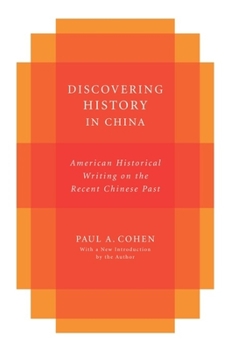Discovering History in China: American Historical Writing on the Recent Chinese Past
(Part of the Studies of the Weatherhead East Asian Institute, Columbia University Series)
Select Format
Select Condition 
Book Overview
Serious study of nineteenth- and twentieth-century Chinese history did not really get under way in the United States until after World War II. Since then, scholarly publication has proliferated and a genuine professional field--by far the largest and most active in the West--has taken shape. Now, for the first time, we have a critical, book-length analysis of this development, written by an insider and structured around the leading conceptual approaches that have informed American scholarship in the postwar decades.
In Paul A. Cohen's view, the supreme problem for American students of Chinese history, particularly in its post-Western impact phase, has been one of ethnocentric distortion. The first two chapters of the book explore this problem in connection with the two approaches that were most influential in American scholarship of the 1950s and 1960s--the impact-response and modernization (tradition-modernity) approaches. In chapter three, Dr. Cohen argues that a third major approach, the "imperialism" approach, although emerging in the late 1960s as a critique of the two earlier approaches, has been no less Western-centric in its basic presuppositions. The final chapter traces the increasing efforts of American historians to move beyond the Western-centric paradigms of the past toward a more China-centered approach to recent Chinese history--an approach that strives empathetically to reconstruct the Chinese past as the Chinese themselves experienced it rather than in terms of an imported sense of historical problem. Dr. Cohen concludes with a discussion of some of the implications of this new approach for our understanding of recent Chinese history. Students of Chinese history, Sino-American relations, and the evolution of American historical scholarship on non-Western societies will welcome this perceptive and thought-provoking book.Format:Paperback
Language:English
ISBN:023105811X
ISBN13:9780231058117
Release Date:April 1997
Publisher:Columbia University Press
Length:243 Pages
Weight:0.80 lbs.
Dimensions:0.7" x 5.9" x 9.0"
Grade Range:Postsecondary and higher
Customer Reviews
1 rating
China at the Center
Published by Thriftbooks.com User , 19 years ago
The following review is based on the 1984 edition. In "Discovering History in China" Cohen argues that much of the scholarship in the West that had occurred on China prior to the mid-1970's, (particularly American scholarship), had been conducted with an "ethnocentric distortion". Because the West had an impact in shaping modern China, pre-World War II (W.W. II) studies on China tended to focus on matters Western countries had a direct role in, such as the Opium Wars, missionary work, the Taiping uprising, sino-foreign trade, etc.. These studies tended to be from missionaries, diplomats, and others who had no formal training as historians. In post-W.W. II studies of China (while the subject matter had widened) emphasis "was still to an overwhelming extent on the shaping role of the Western intrusion"(p.2). Much of what was written after W.W. II, according to Cohen, viewed the Western role in shaping modern China in a positive light. It was not until the liberalism of the late 1960's that historians began to question this purely positive look at imperialism and looked instead at ways the Western involvement in China had affected the "natural forward movement of Chinese history". However, many scholars still saw the West as the main antagonist in preventing China's 'modern development'. Chapter one deals with the amount of influence Western nations had on events shaping China in the late 1800's. Cohen believes that the amount of influence the Western imperialist countries had on events inside China during the late 1800's was negligible overall. It was only after the Tongzhi Restoration that the Western presence in China played any significant role in shaping Chinese affairs. Even the reform efforts of 1898 - how much can be contributed to a reaction to the 'Western threat' and how much can be contributed to reactions to domestic conditions. In the second chapter, "Moving Beyond Tradition and Modernity", Cohen takes aim at the notion of an unchanging China. Much of this section is a variant of the first chapter, where Cohen discusses the views of scholars from the 1950's and 1960's such as Joseph Levenson and John K. Fairbank. During this time the dominant view was that the concept of change or modernization in China was a product of direct contact with the West. In other words, China could not have "modernized" on its own without some kind of impetus from outside. This concept of an unchanging China in American scholarship began to be questioned and negated with the introduction of Philip Kuhn's study "Rebellion and its Enemies in Late Imperial China"(1970). In this study, Kuhn attempts to redefine the question of Chinese modernity, moving away from a belief that change only occurred with help from the Western presence in the mid- to late 1800's to one that scrutinized domestic changes taking place in China long before the Western presence. Much of chapter three "Imperialism: Reality or Myth?" analyzes the diatribe of James Peck





